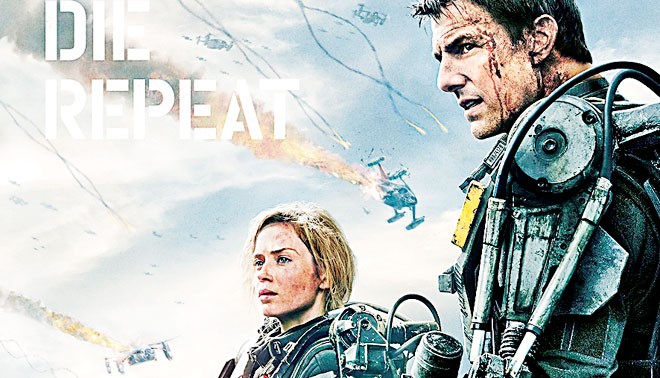

Edge of Tomorrow***
Dir: Doug Liman
Starring: Tom Cruise, Emily Blunt, Brendan Gleeson, Bill Paxton
Ever since he jumped on a couch on Oprah’s talk show and around the same time began going incessantly on about his religion in every interview, audiences around the world (and particularly the US) have wavered in their affection for Tom Cruise. He’s still a star but he’s no longer top gun (and he’s no longer considered that cool or hip either) and diminishing box-office returns have reflected that status. So every new movie of his that isn’t the latest in the Mission:Impossible franchise is up against it in attracting large numbers to the cinemas.
So not only does Edge Of Tomorrow face that difficult task but it has its work further cut out for it by its trailer bearing an uncomfortable similarity to his last film, Oblivion i.e. it looks like a science-fiction action film set in a post-apocalyptic future with Tom Cruise fighting the good fight against dastardly aliens, while driven on by an unexplained connection with a mysterious woman. Unfortunately, Oblivion was a pretty ordinary film with an idiotic plot and, while it made decent numbers, it left a bitter taste in the mouth. Will viewers be willing to be burnt again?
Well, I’m here to tell you that you should get over your fears and head to the theatre for Tom’s latest. It’s not perfect but once you buy into the film’s central conceit then you are in for a pretty decent thrill ride one which boasts good performances, a tight(ish) plot and excellent (if familiar) special effects and action scenes. Best of all, it allows Cruise to actually remind us of some of his charms as well as his acting skills (he was always a pretty decent actor).
The plot – the film’s adapted by screenwriter Christopher McQuarrie (The Usual Suspects) from Japanese writer Hiroshi Sakurazaka’s novel, All You Need Is Kill – allows him to go from being a smarmy (think Jerry Maguire), cowardly PR man to a hard-boiled soldier able to take on the alien nasties while a possible romance plays out at a slow burn in the background. He even gets to be funny – watch the scene where he’s ordered to the front lines by the commander of the United Defence Forces, General Brigham (Brendan Gleeson). And all in the course of the same day. This is because Major William Cage (Cruise) gets to live the same day over and over again allowing him to improve his combat skills and work on a plan to defeat the aliens with the help of poster-girl for the war, Rita Vrataski (Emily Blunt, surprisingly athletic). It is Ground Hog’s Day meets War Of The Worlds meets video game (where you keep getting killed till you get better).
By its very nature, some of the movie is repetitive. But director Doug Liman (Mr. And Mrs. Smith) keeps a tight rein over proceedings, something he’s not always been known to do and the film builds to a genuinely tense climax. The performances are on-the-nose too, including Bill Paxton’s amusingly irascible staff-sergeant.
Cut to chase: This is a genuinely entertaining summer flick.
The Grand Budapest Hotel**** 1/2
Dir: Wes Anderson
Starring: Ralph Fiennes, Tony Revolori, Jude Law, F. Murray Abraham, Tilda Swinton, Edward Norton, Saoirse Ronan, Adrien Brody, Willem Dafoe
Some of Wes Anderson’s movies have been a little too precious in the past. But with his last film, Moonrise Kingdom, and now the charming, whimsical, and, ultimately, moving The Grand Budapest Hotel, Anderson has reached a level where his films are not to be missed.
Those who know Anderson’s work will find plenty here that they are familiar with – eccentric characters, an element of farce, obsessively detailed camera compositions, stop-motion animation and matte backdrops. Also, much of the cast here – in big roles or walk-on parts – consists of actors that Anderson has worked with before. Apart from the actors listed above, Bill Murray, Owen Wilson, Bob Balaban, Jason Schwartzman, Jeff Goldblum, and Harvey Keitel all show up in relatively small parts or walk-ons. So there is a lot here that is recognisable. But now there is an added depth which may have been missing before.
Inspired by the works of Stefan Zweig (1881-1942), the Austrian writer who was incredibly popular both in Europe and America in the first half of the 20th century, but who has fallen out of fashion since then, Anderson has set his movie in the fictional East European country of Zubrowka in the period between the two great wars. Ostensibly dressed up like a comical Tintin caper, involving a murder, a stolen painting and a jail break, the movie is actually about "a glimmer of civilization in the barbaric slaughterhouse we know as humanity." This glimmer is embodied in the shape of the concierge of The Grand Budapest, M. Gustave. Played wonderfully by Ralph Fiennes (who is made to look like Zweig), Gustave is conceited and courteous, vain and generous, abstinent and hedonistic, and of questionable sexuality. But he also represents the passing of an age, a gentler but vital age which was soon to vanish under the boot of totalitarianism and violence. That nostalgia underpins the movie as does the reminder that a darkness constantly looms just beyond the horizon ready to obliterate all that is of value given half a chance.
Cut to chase: A must-see.